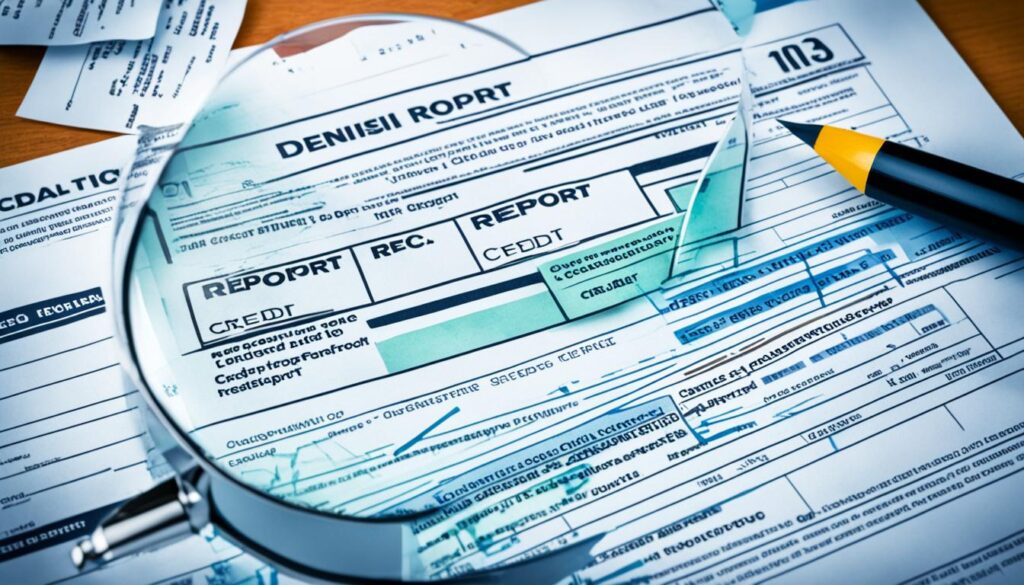What Happens If a Credit Dispute Is Denied A denied credit dispute can be frustrating. You’ve filed a credit dispute, but it’s been rejected. Don’t lose hope – this isn’t the end.
Understanding the denial reason is key. Knowing your next steps can help you navigate this challenge effectively.
The credit repair process can be tricky. However, with the right knowledge, you can work towards fixing credit report errors.
Let’s explore what happens after a credit dispute denial. We’ll outline steps to address the issue and protect your rights.
We’ll cover the dispute process and consumer protection laws. This guide will help you tackle a denied dispute confidently.
Key Takeaways
- A denied credit dispute isn’t final – you have options
- Understanding the reason for denial is crucial
- Gathering additional evidence can strengthen your case
- You have rights under the Fair Credit Reporting Act
- Professional assistance may be helpful in complex cases
- Resubmitting a dispute with new information is possible
- Alternative resolution methods are available if needed
Understanding Credit Disputes: An Overview
Credit disputes are vital for maintaining financial health. Spotting errors on your credit report requires swift action. This helps protect your credit score and financial reputation. what happens if my dispute is denied
Taking action safeguards your financial future. It’s crucial to address any discrepancies promptly.
Types of Credit Disputes
There are several types of credit disputes you might encounter:
- Billing error dispute: This occurs when you find an incorrect charge on your bill.
- Unauthorized transaction dispute: When someone uses your card without permission.
- Fraudulent charge dispute: Similar to unauthorized transactions, but often involves identity theft.
The Dispute Process Explained
The dispute process involves several steps:
- Identify the error on your credit report
- Gather supporting documents
- File a dispute with the credit bureau
- Wait for the investigation results
- Review the outcome and take further action if needed
Knowing your rights and options is key when dealing with credit disputes. This knowledge helps you navigate the process more effectively.
You can find more information about credit repair tips to boost your financial health.
Timeframes for Dispute Resolution
Credit bureaus usually have 30 days to investigate and resolve disputes. Here’s a breakdown of common timeframes:
| Dispute Type | Average Resolution Time | Maximum Time Allowed |
|---|---|---|
| Billing error dispute | 2-3 weeks | 30 days |
| Unauthorized transaction dispute | 1-2 weeks | 30 days |
| Fraudulent charge dispute | 3-4 weeks | 45 days |
These timeframes can change based on your case’s complexity. The responsiveness of involved parties also affects resolution time.
Stay patient and follow up regularly during the dispute process. This helps ensure a timely resolution to your credit issues.
Common Reasons for Denied Credit Disputes

Credit disputes don’t always favor consumers. Knowing why claims get denied helps in resolving payment disputes. Let’s look at the main reasons for rejections.
Insufficient evidence is a key cause for denial. You need solid proof to support your case against a merchant. This may include receipts, emails, or photos of damaged goods.
Expired time limits can lead to automatic rejections. Most credit card companies have specific windows for filing disputes. Missing this deadline can hurt your claim.
Merchants sometimes provide strong evidence against your claim. They might show proof of delivery or a signed agreement. This can contradict your dispute.
| Reason for Denial | Description | How to Avoid |
|---|---|---|
| Insufficient Evidence | Lack of supporting documents | Gather all relevant receipts and correspondence |
| Expired Time Limit | Dispute filed too late | Know your card’s dispute deadline and act promptly |
| Merchant Evidence | Seller provides proof against claim | Ensure your dispute is valid before filing |
Understanding these common issues can strengthen your future disputes. It increases your chances of successful payment dispute resolution. Be prepared and act quickly for the best results.
The Impact of a Denied Dispute on Your Credit Score
A denied credit dispute can hurt your credit score. Knowing the effects helps you handle this tough situation better.
Short-term effects
When a dispute is denied, your credit report stays the same. Negative items remain, still affecting your credit score. Your score might drop briefly as credit bureaus process the outcome.
Long-term consequences
Long-term effects of a denied dispute can be worse. Negative items stay on your report for up to seven years. This can make it hard to get loans or good interest rates.
How to mitigate negative impacts
To reduce the impact of a denied dispute, try these strategies:
- Review your credit report carefully for any errors
- Gather additional evidence to support your claim
- Consider professional credit repair services
- Focus on building positive credit history
| Action | Potential Credit Score Impact |
|---|---|
| Paying bills on time | +20 to +60 points |
| Reducing credit utilization | +20 to +40 points |
| Disputing inaccurate information | +50 to +100 points |
| Adding positive accounts | +10 to +30 points |
You can improve your credit score even after a denied dispute. Take action and build good habits. This is key to better credit health over time.
Analyzing the Denial: What to Look For

When your credit dispute is denied, review the credit bureau’s letter carefully. This document explains why your dispute was rejected. It contains crucial information for your next steps.
Examine the denial reasoning provided by the credit bureau. They must explain their decision, often citing evidence supporting the current report information. Check for details about the creditor’s response or submitted documents.
During your evidence review, focus on these key elements:
- Accuracy of personal information
- Dates and amounts of reported debts
- Account status (open, closed, delinquent)
- Any supporting documentation provided
If the denial letter seems unclear or incomplete, you can ask for more information. Smart Dispute AI can help identify discrepancies and gather evidence for an appeal.
“Understanding the reasons behind a dispute denial is the first step towards a successful resolution. Don’t hesitate to ask for clarification if anything seems unclear.”
Analyzing the denial and its evidence prepares you for your next move. You might submit more documents, contact the creditor, or seek professional help.
Your Rights Under the Fair Credit Reporting Act (FCRA)
The Fair Credit Reporting Act (FCRA) protects your credit information rights. This federal law ensures fairness in credit reporting. It gives you control over your financial data.
Understanding FCRA Protections
FCRA gives you the right to see your credit report. You can dispute wrong information and know if it’s used against you. The Fair Credit Reporting Act also limits who can access your report.
Leveraging FCRA in Your Favor
Stay informed about your credit reports to use FCRA rights. Get free copies yearly from each major credit bureau. Spot errors? File disputes right away.
Credit agencies must look into your claims quickly. This helps keep your credit report accurate and fair.
Time Limits for Disputes Under FCRA
FCRA sets time limits for solving disputes. Credit bureaus usually have 30 days to check and answer your dispute. If new info comes up, they may get 15 more days.
| FCRA Provision | Time Limit |
|---|---|
| Initial Investigation | 30 days |
| Extended Investigation | 45 days |
| Reinsertion of Deleted Information | 5 days notice |
Know your FCRA rights to guard your credit. This knowledge helps protect your financial health. Use these rights to keep your credit report fair and correct.
Dispute Provisional Credit: What You Need to Know

Banks may offer provisional credit when you dispute a credit card charge. This temporary credit is applied during the investigation. Understanding how it works is vital for your financial well-being.
Provisional credit provides funds access during disputes. Banks usually issue it within 10 business days of your claim. Be careful about spending it, though. You’ll need to repay if the dispute is denied.
The provisional credit process can be tricky. Here’s what happens:
- You file a dispute for an unauthorized charge
- The bank issues provisional credit
- They investigate the claim
- If approved, the credit becomes permanent
- If denied, you face a provisional credit reversal
A provisional credit reversal can be surprising. You might struggle if you’ve spent the funds. To avoid issues, don’t touch the disputed amount until the investigation ends.
“Treat provisional credit as a safety net, not extra cash. It’s there to protect you during the dispute process.”
Knowing your rights is crucial in credit disputes. The Fair Credit Reporting Act protects you. It’s smart to monitor your credit report often. This helps you spot and dispute errors quickly.
| Aspect | Provisional Credit | Regular Credit |
|---|---|---|
| Duration | Temporary | Permanent |
| Availability | During dispute investigation | Always |
| Risk of reversal | High | Low |
| Impact on credit score | Neutral | Positive |
Provisional credit protects consumers during disputes. Use it wisely and stay informed about your dispute status. This approach will help you avoid unexpected financial issues.
Steps to Take After a Denied Credit Dispute
Don’t give up if your credit or debit card dispute is denied. You have options to continue the dispute resolution process. Let’s look at what you can do next.
Gathering Additional Evidence
Start by collecting more proof to support your case. This could include receipts, emails, or photos of the disputed transaction. Stronger evidence improves your chances of overturning the denial.
Contacting the Creditor Directly
Reach out to your creditor or card issuer directly. Explain your situation calmly and present your new evidence. A direct conversation can often lead to faster resolution than formal channels.
Seeking Professional Assistance
If you’re still stuck, consider getting expert help. Credit counselors or consumer rights lawyers can guide you through complex dispute steps. They understand credit laws and can advocate for you effectively.
| Action | Benefits | Considerations |
|---|---|---|
| Gather Evidence | Strengthens your case | Time-consuming |
| Contact Creditor | Potential quick resolution | May need negotiation skills |
| Seek Professional Help | Expert guidance | Additional costs |
Persistence is key in credit dispute resolution. Stay organized and keep records of all communications. Don’t hesitate to escalate your case if needed.
With the right approach, you can boost your chances of a successful outcome. Keep pushing forward and use these steps to resolve your dispute.
Resubmitting Your Dispute: Best Practices
Don’t give up if your credit dispute gets denied. A smart resubmission can turn things around. Review denial reasons carefully to build your new strategy.
Gathering evidence is crucial. Collect new, compelling proof to support your claim. This could include various documents.
- Bank statements
- Correspondence with creditors
- Payment receipts
- Legal documents
Write a clear, concise dispute letter. Address each denial point with facts. Avoid emotional language and focus on presenting a strong case.
For expert help, consider a credit repair service. They can provide valuable insights on effective dispute resubmission tactics.
“A well-prepared dispute resubmission can significantly increase your chances of success.”
Keep copies of all sent documents. Use certified mail for important letters. This creates a paper trail and ensures receipt.
Stay patient and persistent. Credit bureaus have 30 days to investigate your resubmitted dispute. Following these practices increases your chances of success.
Remember, improving your credit score takes time. Each step, including effective resubmissions, brings you closer to your goals.
Alternative Dispute Resolution Methods
Alternative dispute resolution methods offer new ways to resolve credit issues. These approaches can save time and money compared to legal routes. They’re useful when standard credit disputes fail.
Mediation Options
Mediation brings parties together with a neutral third party. It aims to find mutually agreeable solutions. Many find mediation helpful for resolving complex credit issues through open dialogue.
Arbitration Processes
Arbitration involves a neutral arbitrator who hears both sides. They make a binding decision. This method is more structured than mediation but less formal than court.
It can be quicker and cheaper than lawsuits. That’s why it’s a popular choice for credit disputes.
Small Claims Court Considerations
Small claims court is for disputes involving smaller amounts. It’s less formal than regular court. You can represent yourself in small claims court.
This route may work for simple credit issues. It’s an option when other methods have failed.
| Method | Pros | Cons |
|---|---|---|
| Mediation | Flexible, collaborative | Non-binding |
| Arbitration | Binding, faster than court | Limited appeals |
| Small Claims | Affordable, simple process | Limited award amounts |
Each method has its place in addressing credit issues. Think about your situation when choosing the best approach. Pick the one that fits your needs best.
Preventing Future Disputes: Best Practices
Proactive steps can save you time and stress in dispute prevention. Regular credit monitoring helps catch potential issues early. Set up alerts and check your credit reports often.
Transaction verification is crucial. Review your statements carefully each month. Compare receipts against credit card bills to spot unauthorized charges quickly.
Maintain open communication with your creditors. If you notice a discrepancy, reach out immediately. Many issues can be resolved with a simple phone call.
“Prevention is better than cure. Regular credit monitoring and prompt communication can prevent most disputes.”
Keep detailed financial records. Organize your bills, bank statements, and creditor correspondence. This documentation is invaluable if you need to file a dispute later.
- Set up automatic payments to avoid missed due dates
- Use strong, unique passwords for all financial accounts
- Be cautious when sharing personal information online
Implementing these practices will reduce the likelihood of future credit disputes. Stay vigilant about your credit health. It’s an ongoing process that pays off long-term.
Conclusion
Credit dispute resolution is crucial for your financial well-being. If your dispute is denied, don’t lose hope. Take time to review your options carefully.
Remember, you have consumer rights. It’s worth fighting for accurate credit reports. Gather more evidence or seek expert help if necessary.
The Fair Credit Reporting Act provides tools to challenge errors. Stay organized and keep detailed records throughout the process. This can significantly improve your chances of resolving disputes.
Your credit score impacts many aspects of life. Understanding the dispute process helps you control your financial future. Keep learning and stay vigilant about your credit profile.
Don’t hesitate to ask for help when needed. Your efforts to maintain healthy credit will benefit you in the long run.

